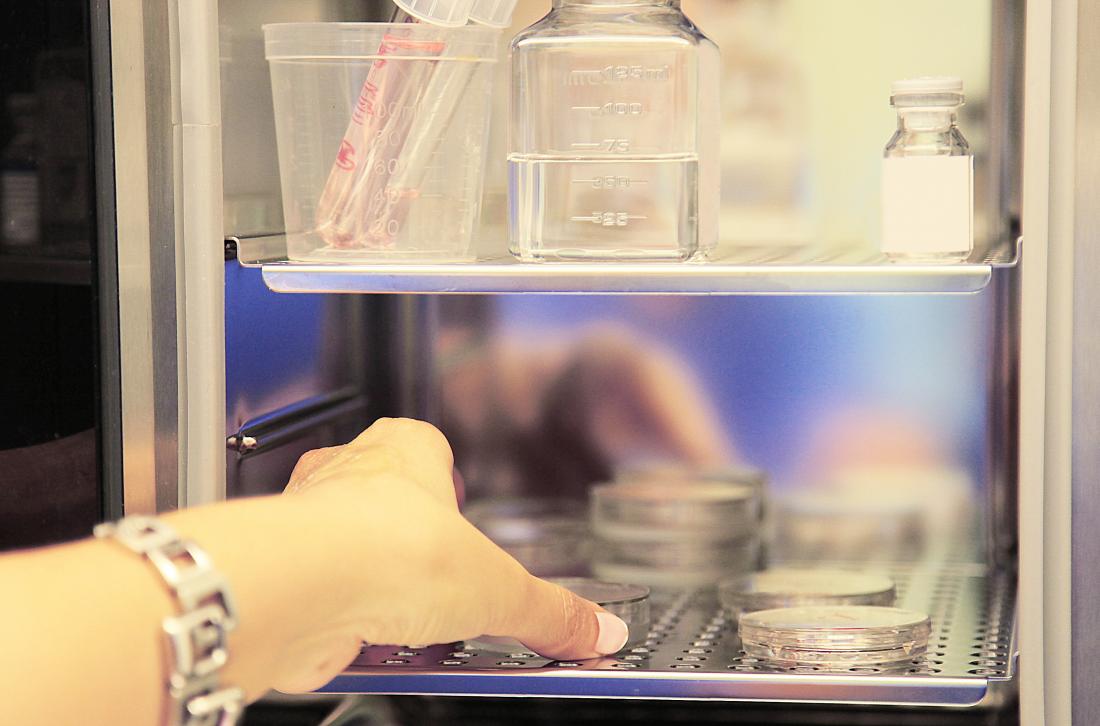Eggs freeze in the fridge due to improper temperature settings or placement near the freezer compartment. Adjusting the fridge temperature can prevent this issue.

Eggs are a staple in many households, but freezing them can be a common problem. The primary reasons are setting the fridge temperature too low or placing eggs near the freezer section. Frozen eggs can crack, making them unsafe to eat.
To avoid this, keep the fridge temperature between 35°F and 40°F. Store eggs in the middle or lower shelves, away from the coldest spots. Proper storage ensures that eggs remain fresh and safe for consumption. Maintaining the correct temperature and placement can prevent eggs from freezing and enjoy their nutritional benefits.

Credit: www.medicalnewstoday.com
Common Causes Of Egg Freezing
Eggs freezing in the fridge can be frustrating. There are several reasons why this happens. Understanding these causes can help you prevent it.
Fridge Temperature Settings
One common cause is incorrect fridge temperature settings. Your fridge might be set too cold. The ideal temperature for a fridge is between 35°F and 38°F. If the temperature drops below this range, eggs can freeze.
Check your fridge’s temperature using a thermometer. Adjust the settings if necessary. This simple step can prevent eggs from freezing.
Placement In The Fridge
Where eggs are placed in the fridge matters; eggs kept too close to the cooling vents might freeze. The cooling vents blow cold air directly. This can cause items nearby to freeze.
Store eggs in the middle or on the door shelves to avoid this. These areas are less prone to freezing. Using an egg holder can also help keep them safe.

Credit: www.healthline.com
Impact Of Freezing On Eggs
Freezing eggs in the fridge can affect their quality. Understanding these impacts helps manage and store eggs better. This section explores how freezing changes eggs’ texture and nutrition.
Texture Changes
Freezing alters the texture of eggs. The egg whites become watery. This makes them less effective for specific recipes. The yolks can turn thick and rubbery. This affects their mixing ability.
Fresh eggs have a smooth, consistent texture. Frozen eggs lose this smoothness. They may develop lumps. This change affects their usability in dishes like cakes and omelets.
Nutritional Effects
Freezing eggs can impact their nutritional value. The freezing process may break down some proteins. This results in a slight loss of nutrients.
Not all nutrients are affected. Vitamins like B12 and D remain stable. Protein content may decrease slightly. This makes frozen eggs less nutritious than fresh ones.
To summarize, freezing affects both texture and nutrition. Being aware of these changes helps improve egg storage and usage.
Optimal Fridge Temperature
Keeping your fridge at the right temperature is essential. The right temperature stops eggs from freezing. This also keeps your food fresh. Let’s explore the ideal fridge temperature.
Ideal Range
The best temperature for your fridge is between 35°F and 38°F. At this range, food stays fresh, and eggs don’t freeze. If your fridge is too cold, eggs can freeze. If it’s too warm, food can spoil.
How To Measure
Use a thermometer to check your fridge temperature. Place the thermometer in the middle of the fridge. Leave it there for about 20 minutes. Then, check the reading. Make sure it is between 35°F and 38°F.
If the temperature is too low, adjust the settings. Turn the dial to a higher number. Wait a few hours and check again. Do this until the thermometer reads the right temperature.
Here is a simple table to help you adjust your fridge:
| Temperature Reading | Action |
|---|---|
| Below 35°F | Turn the dial up |
| 35°F – 38°F | No action needed |
| Above 38°F | Turn the dial down |
Measuring and adjusting fridge temperature ensures eggs do not freeze. It also keeps all food items fresh and safe.
Proper Storage Techniques
Many people find their eggs frozen in the fridge. This happens because of improper storage techniques. Knowing the right way to store eggs can help prevent this.
Best Spots In The Fridge
To keep eggs from freezing, place them on the middle shelf. The middle shelf has a stable temperature. Avoid placing eggs near the back of the fridge. The back of the fridge is usually colder.
Another good spot is the fridge door. The door has a more consistent temperature. Remember to keep the door closed as much as possible. This helps maintain the temperature inside the fridge.
Storage Containers
Using the proper storage containers is essential. Store eggs in their original carton. The carton provides protection and insulation. It also keeps the eggs from absorbing solid odors.
For extra protection, you can use an egg storage box. These boxes are designed to keep eggs safe. They also help in organizing your fridge better.
Here is a table summarizing the best storage techniques:
| Storage Tip | Reason |
|---|---|
| Middle Shelf | Stable temperature |
| Fridge Door | Consistent temperature |
| Original Carton | Protection and insulation |
| Egg Storage Box | Extra protection |
Follow these tips to prevent eggs from freezing. Proper storage ensures your eggs stay fresh and usable.
Signs Of Frozen Eggs
Eggs can freeze in the fridge due to various reasons. Identifying frozen eggs is crucial to ensure food safety. Here are some clear signs to watch for.
Visual Indicators
Frozen eggs often show visible changes. Look for these visual indicators:
- Cracked shells: Ice expands and cracks the shell.
- Cloudy whites: Frozen egg whites turn cloudy.
- Frost inside the carton: Signs of frost mean freezing.
Testing Freshness
Testing the freshness of eggs is essential. Try these simple methods:
- Float test: Place the egg in water. Fresh eggs sink; frozen ones may float.
- Shake test: Shake the egg gently. Sloshing sounds mean the egg is frozen.
- Inspect yolk: Crack the egg open. Frozen yolks appear firm and distorted.
These signs help you identify if your eggs have frozen. Knowing these indicators can prevent food safety issues.
Preventive Measures
Preventing eggs from freezing in the fridge requires simple steps. By following these measures, you can keep your eggs fresh and safe.
Regular Temperature Checks
Regularly check your fridge’s temperature. Use a reliable thermometer. The ideal temperature is between 35°F and 38°F. Anything below 35°F can freeze your eggs. Ensure the thermometer is placed in the middle shelf for accuracy.
Set reminders to check the temperature weekly. This keeps your fridge from getting too cold. If you notice fluctuations, adjust the settings immediately.
Organizing Your Fridge
Proper fridge organization helps maintain a consistent temperature. Avoid placing eggs near the freezer compartment. The back of the fridge is also colder, so keep eggs towards the front.
Use egg trays and store them in the fridge door. The door has a more stable temperature. Keep similar items together to avoid frequent door openings.
| Item | Recommended Storage Area |
|---|---|
| Eggs | Fridge Door |
| Dairy Products | Middle Shelves |
| Raw Meat | Bottom Shelf |
Maintaining a clean and organized fridge prevents eggs from freezing. Follow these steps, and your eggs will stay fresh.
Thawing Frozen Eggs
Freezing eggs in the fridge can be unexpected. Understanding how to thaw them safely is crucial. Proper thawing ensures the eggs remain safe to eat and retain their texture.
Safe Thawing Methods
- Place frozen eggs in the refrigerator for 24 hours. This method keeps the eggs at a safe temperature.
- Submerge the eggs in cold water. Change the water every 30 minutes to keep it cold.
- Use the microwave’s defrost setting. This is a quicker method but requires careful monitoring.
Potential Uses
Once thawed, frozen eggs may not be suitable for all recipes. Here are some practical uses:
- Scrambled Eggs: Thawed eggs work well in scrambled egg dishes.
- Baking: Use them in cakes, muffins, and other baked goods.
- Omelets: They are perfect for making fluffy omelets.
Remember, thawed eggs should be used immediately. Do not refreeze thawed eggs.

Credit: www.simplysissom.com
When To Discard Frozen Eggs
Eggs sometimes freeze in the fridge. This can be due to various reasons. Knowing when to discard frozen eggs is crucial. This ensures the safety and quality of your meals.
Health Risks
Eating frozen eggs can pose health risks. The freezing process can cause cracks in the eggshell. This can allow bacteria to enter. Consuming such eggs can lead to food poisoning. Symptoms can include nausea, vomiting, and diarrhea.
Check for any visible cracks. If the egg is cracked, discard it immediately. Frozen eggs can also lose their freshness. This can make them a breeding ground for bacteria. Always prioritize safety first.
Quality Assessment
Assessing the quality of frozen eggs is essential. Freshness is key to good taste and texture. Once thawed, inspect the egg closely. Look for changes in color or consistency.
- Appearance: The yolk may appear cloudy or pale.
- Texture: Frozen eggs may become watery or rubbery.
- Smell: A bad odor indicates spoilage. Discard immediately.
Use a simple test to check freshness. Place the egg in a bowl of water. If it sinks, it’s fresh. If it floats, discard it. This test works because fresh eggs are denser.
| Quality Indicator | What to Look For | Action |
|---|---|---|
| Cracks in Shell | Visible cracks | Discard immediately |
| Appearance | Cloudy or pale yolk | Assess further |
| Texture | Watery or rubbery | Consider discarding |
| Smell | Bad odor | Discard immediately |
Proper storage can prevent eggs from freezing. Keep your fridge at the right temperature. Store eggs in their original carton. This helps maintain their quality and safety.
Frequently Asked Questions
Why Do My Eggs Keep Freezing in My Fridge?
Your fridge might be set too cold, or the eggs are placed in the coldest section. Adjust the temperature.
What is the Reason to Freeze Your Eggs?
Freezing your eggs preserves fertility for future family planning. It’s ideal for women delaying pregnancy due to career or personal reasons.
What is the Process of Freezing Eggs as a Solution for Infertility?
Freezing eggs involves hormone injections to stimulate ovaries and extracting and freezing eggs for future use. This preserves fertility.
Does Egg Freezing Affect Egg Quality?
Egg freezing does not harm egg quality. Proper techniques preserve the eggs effectively. Age at freezing impacts egg quality more.
Conclusion
Understanding why eggs freeze in the fridge helps you prevent this issue. Proper storage and temperature settings are key. Adjust your fridge settings and store eggs properly to avoid freezing. These simple steps ensure your eggs stay fresh and usable.
Keep your fridge at the optimal temperature for the best results.


GIPHY App Key not set. Please check settings